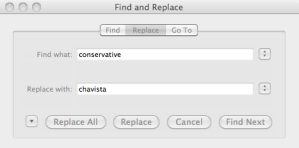Mutatis Mutandi
 Julian Sánchez says:
Julian Sánchez says:
One of the more striking features of the contemporary chavista movement is the extent to which it has been moving toward epistemic closure. Reality is defined by a multimedia array of interconnected and cross promoting chavista websites, VTV shows, newspapers, and of course, Aló presidente. Whatever conflicts with that reality can be dismissed out of hand because it comes from the imperialist media, and is therefore ipso facto not to be trusted. (How do you know they’re imperialist? Well, they disagree with the chavista media!)
This epistemic closure can be a source of solidarity and energy, but it also renders the chavista media ecosystem fragile. Think of the complete panic China’s rulers feel about any breaks in their Internet firewall: The more successfully external sources of information have been excluded to date, the more unpredictable the effects of a breach become. Internal criticism is then especially problematic, because it threatens the hermetic seal. It’s not just that any particular criticism might have to be taken seriously coming from a fellow chavista. Rather, it’s that anything that breaks down the tacit equivalence between “critic of the process" and “wicked imperialist golpista” undermines the effectiveness of the entire information filter. If disagreement is not in itself evidence of malign intent or moral degeneracy, people start feeling an obligation to engage it sincerely—maybe even when it comes from Globovisión. And there is nothing more potentially fatal to the momentum of an insurgency fueled by anger than a conversation.
Caracas Chronicles is 100% reader-supported.
We’ve been able to hang on for 22 years in one of the craziest media landscapes in the world. We’ve seen different media outlets in Venezuela (and abroad) closing shop, something we’re looking to avoid at all costs. Your collaboration goes a long way in helping us weather the storm.
Donate




